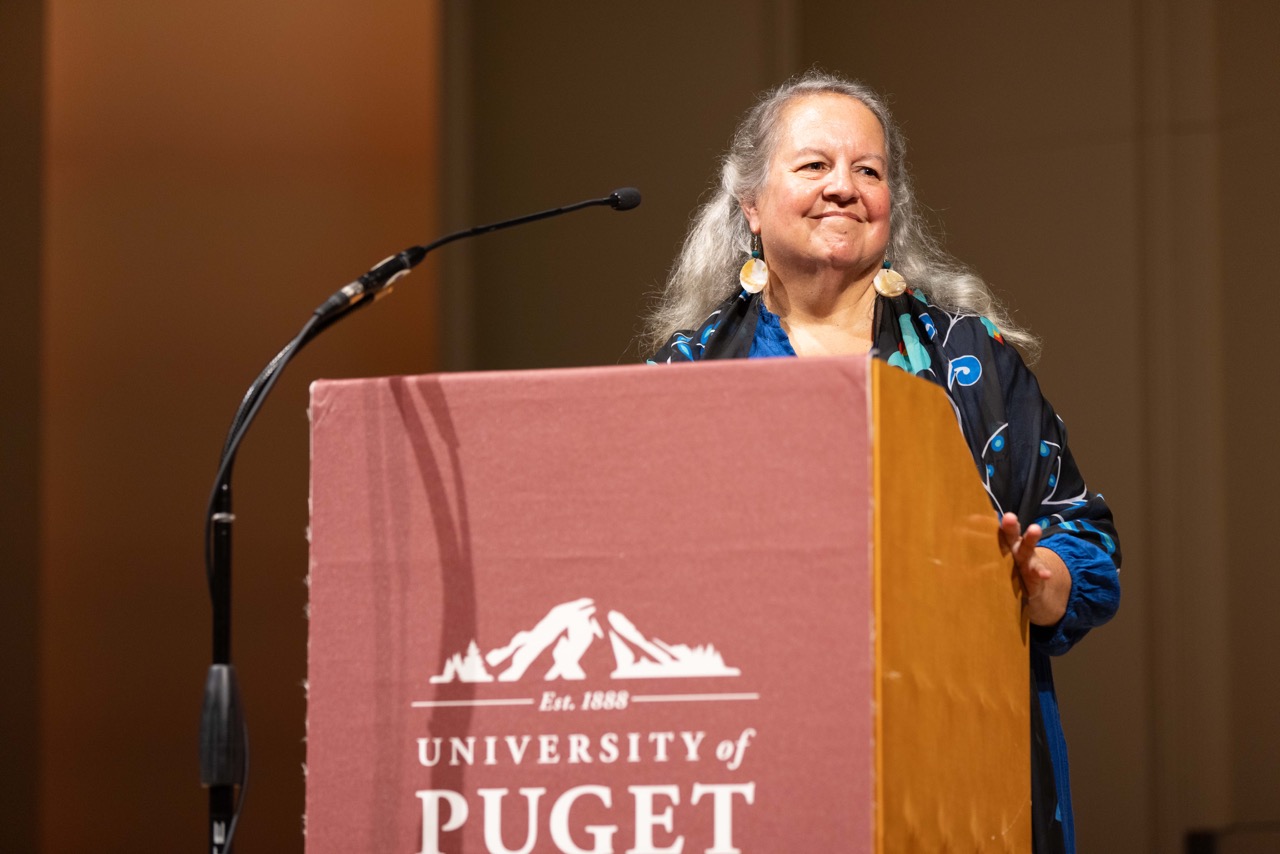Filling the Dish with One Spoon: Robin Wall Kimmerer and Reciprocal Ecological Restoration

By Andrew Benoit and Erin Hurley
In 1701, over 3,000 people, representing 30 indigenous nations — and the French — met in Montreal to agree to one of the world’s first international conservation treaties, known as the “naagan ge bezhig emkwaan,” or “the dish with one spoon.” Robin Wall Kimmerer, renowned ecologist and member of the Potawatomi nation, who delivered the Swope Endowed Lecture on Sep 24, explained that the treaty stipulated sharing the resources provided by mother earth between the different indigenous groups in the eastern Great Lakes region. “We are fed from the bowl that Mother Earth gives to us,” Kimmerer told a sold out Schneebeck Hall. The rest of her lecture focused on how our actions can keep that bowl full in this day and age. How can we heal not only the earth which we have damaged, but also our broken relationship with it? Kimmerer’s answer has the kind of simplistic beauty that has come to typify her work: reciprocity and ecological restoration, using parallel knowledge systems of western and indigenous science.
Indigenous members of the campus community were especially touched by her lecture. “It is a tremendous honor to host such a tremendous presence,” said Prof. Katherine Crocker, a member of the Kaw Nation of what is today called Oklahoma, who moderated the Q&A section. “Without her, the work of myself and other indigenous scholars would be lesser,” Crocker said.
A decorated professor and author, Kimmerer presents at lectures worldwide and shares her knowledge through books and articles. “Braiding Sweetgrass: Indigenous Wisdom, Scientific Knowledge and the Teachings of Plants” received high acclaim, landing a spot on the New York Times Bestseller list for 129 weeks.
Throughout the day, Kimmerer met with indigenous students, faculty and members of the Muckleshoot and Puyallup tribes. They engaged in constructive dialogue surrounding Indigenous community, curriculum and programming on campus. Though she explains that it is only “baby steps,” the faculty expressed a “sincere willingness” to create partnerships with tribal communities and attempt to indigenize the curriculum at Puget Sound.
Ecological restoration is only one part of restoring land justice. While people have often separated them, the environmental movement and social justice movement are inextricably linked. Kimmerer’s lecture discussed the Land Back movement, which demands the return of land to Indigenous care and stewardship and plays a critical role in land justice.
Despite the positive nature of her work in the face of increasingly dire crises, Kimmerer doesn’t necessarily see her work as hopeful. “What it really comes down to is not hope for the world, but love for the world. And what does it look like to act on love for the world?” she asked. This kind of love comes easily to Kimmerer, based on a confident belief in the people she sees around her. “It’s not that we don’t have dire threats against us. We do, but there’s so much brilliant creativity and problem solving. We have to believe in that,” Kimmerer said.
Kimmerer’s problem solving is fundamentally based in fostering a deep relationship with the land. She draws lessons and ideas from the plants, animals and their relationships in the environment around us. One of her favorite environmental teachers is moss, a simple but mighty plant. Her eyes and voice lit up with contagious enthusiasm when she talked about them. “Look at mosses everywhere. They’re gorgeous. You know, there’s so much diversity, so much life. To me, that’s a currency of well being,” she said.
Mosses, despite their small size, have outlived every other plant group on the planet. While most species — 99% of all species that have ever lived, in fact — have gone extinct in one of the Earth’s various climate shifts, the lowly moss survived. To Kimmerer, the longevity of mosses calls into question our definition of success. “There’s another way to be successful, and that is to create beauty everywhere you go, to be part of systems that are inherently cooperative, not competitive, and to live within your ecological means,” she said.
This emphasis on cooperative systems points to Kimmerer’s broader critique of capitalism, which is largely responsible for the damage done to the Earth and our relationship with it. “I accumulate more than you. So it’s about individuality. It’s about having much more than you need, about consuming too much,” she said. According to Kimmerer, we must find our own ways to subvert the worst aspects of capitalism with reciprocal economies on our own scales. “We’re going to use all of the tools available to us, science and technology and engineering and ethics and stories and art and governance, all of those things together to commit to the future that we want to have,” Kimmerer explained. “It’s our spiritual and pragmatic responsibility.”
Right now, Kimmerer says that we need a shift in culture. “Sometimes crisis propels that shift. But I think that stories and ethics and lived experience of right relationship can also move us in that direction. Can it move us fast enough to avoid the crises that we’ve created for ourselves?” she asked. After a pause she added, “I don’t know.”
A recording of Robin Wall Kimmerer’s lecture from Sept. 24 is available to stream on the University’s YouTube channel.
